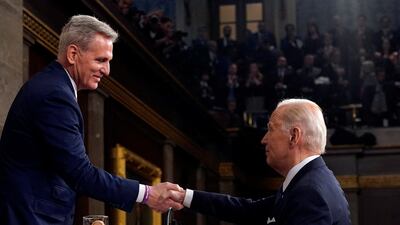President Joe Biden and House Speaker Kevin McCarthy are banking on there being sufficient middle ground in the tentative debt ceiling deal for it to pass before the US Treasury runs out of money on June 5.
“No one got everything they want,” Mr Biden said. “But that’s the responsibility of governing. I strongly urge both chambers to pass that agreement.”
The bill's top line is that it would keep non-defence spending roughly flat in the 2024 fiscal year and increase it by 1 per cent the following year, as well as suspend the debt limit until January 2025 – past the next presidential election.
Here is a look at some of the other key provisions detailed in the 99-page bill.
Winners
The Pentagon
As has been the case for years, the US Defence Department remains untouchable when it comes to reining in spending.
The deal would boost total defence spending to $886 billion, in line with Mr Biden's 2024 budget spending proposal. That amounts to an increase of about 3 per cent from the $858 billion allocated in the current budget for the Pentagon and other defence-related programmes in other agencies.
America already spends more on defence than the next nine countries combined.
Veterans
The agreement would fully fund medical care for veterans at the levels included in Mr Biden's proposed 2024 budget blueprint, including a fund dedicated to veterans who have been exposed to toxic substances or environmental hazards. Mr Biden sought $20.3 billion for the toxic exposure fund in his budget.
Senator Joe Manchin
The deal enacts changes in the National Environmental Policy Act for the first time in nearly four decades that would designate “a single lead agency” to develop and schedule environmental reviews, in hopes of streamlining the process.
It also gives special treatment to a West Virginia natural gas pipeline championed by conservative Democratic Senator Joe Manchin, by approving all its outstanding permit requests.
Medicaid recipients
America’s tatty safety net would have been further frayed under an original proposal by House Republicans to create work requirements for some people on Medicaid, the US health care programme for people on low or no incomes.
But that requirement was left out of the final agreement after facing stiff opposition from the White House and congressional Democrats, who said it would lead to fewer people able to afford food or health care without actually increasing the number of people in the workforce.
Clean energy tax breaks
Also absent from the final deal is a Republican proposal to repeal many of the clean energy tax credits Democrats passed in party-line votes last year to boost the production and consumption of clean energy. Mr McCarthy and Republicans have argued that the tax breaks “distort the market and waste taxpayer money.”
Losers
People who rely on help buying food
The agreement would expand work requirements for the Supplemental Nutrition Assistance Programme (Snap), formerly known as food stamps – a longtime Republican priority.
Work requirements already exist for most able-bodied adults between the ages of 18 and 49. The bill would phase in higher age limits, bringing the maximum age to 54 by 2025. But the provision expires, bringing the maximum age back down to age 49 five years later, in 2030.
The Internal Revenue Service
Republicans targeted money that the IRS was allotted last year to crack down on tax fraud. The bill bites into some IRS funding, rescinding $1.4 billion.
Pandemic recovery
The agreement would rescind about $30 billion in unspent coronavirus relief money that Congress approved through previous bills. It claws back unobligated money from dozens of federal programmes that received aid during the pandemic, including rental assistance, small business loans and broadband for rural areas.
Student loan holders
Republicans have long sought to reel back the Biden administration's efforts to provide student loan relief and aid to millions of borrowers during the coronavirus pandemic. While the Republican proposal to rescind the White House's plan to waive $10,000 to $20,000 in debt for nearly all borrowers failed to make it into the package, Mr Biden agreed to put an end to the pause on student loan repayment.
The pause in student loan repayments would end in the final days of August.
How are politicians reacting?
Mr McCarthy, who faced a gruelling fight to become House Speaker, said he expects a majority of Republicans to vote for the emerging bill, defending it is as a “transformational” move to rein in federal spending even though “maybe it doesn’t do everything for everyone”.
Similarly, the White House touted the deal as preserving key Democratic priorities.
The deal was made over a holiday weekend, with lawmakers away for the Memorial Day holiday, so reaction was muted overall.
However, some howls of outrage were heard from both ends of the political spectrum, with hard-right Republicans saying the deal doesn't do enough to rein in spending on social programmes, while progressive Democrats say the bill unfairly targets some of the country's most vulnerable people.
“Fake conservatives agree to fake spending cuts,” Senator Rand Paul tweeted.
Agencies contributed to this report.


